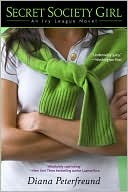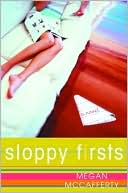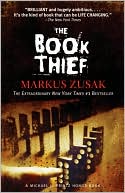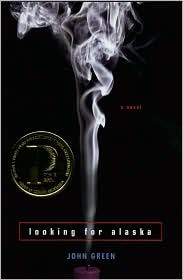It’s difficult to argue that there’s a better scenario for literary agents and publishing houses than stumbling upon a true crossover novel, i.e. a novel which spans more than one audience. After all, it’s the kind of math even the dumbest of Kardashians could do–X+Y is greater than either X or Y alone. Sure, having a teen audience is great, but having a teen and adult audience is the kind of thing that practically flings books from the shelves. For whatever it may say about our country, there’s a reason Twilight was a huge hit–both kids and adults alike were somehow drawn into the story of a sparkly bloodsucker and his brittle ice princess, which means both kids and adults were buying those glossy black books.
What’s a little easier to argue about is what actually makes a book a crossover. What was it about Stephenie Meyer’s work–or even J.K. Rowling’s–that made agents and publishers think, “Hey, unlike Trix, these are not just for kids?” And honestly, I’m not sure. (I mean, give props to the people who discovered Stephenie Meyer for thinking that piece of manuscript would appeal to anybody, amirite?) But here’s what I think makes a crossover, plus some recommendations that fit the bill.
1) Universal themes. Not being able to get a prom date? Feeling bullied by the cool girls? Sure, those are the kinds of things that rear their heads in some form or another throughout life, but set in high school, they just seem so…high school. But loss, isolation, abandonment, substance abuse, sexual abuse… these are the kinds of things that stay with you a lifetime, which is precisely why just about all “Edgy YA” books are crossovers.
Recommendations: See my earlier post
2) Feature characters of a “crossover” age. Few YA books are a harder sell than ones set in college. As one agent helpfully explained to me, kids in high school want to read about kids their own age, and once they get any older, they want to read about adults. So who wants to read about 18-23-year-olds? You do, because when you do see YA books featuring kids in college, they’re probably pretty damn good to have pushed through the “Sorry, we can’t sell books set in college” barrier. Plus, college is the best of all worlds–you don’t have to watch the author struggle to deal with the adults, the way they often have to do with books set younger, but you’re still dealing with characters who generally don’t have to deal with the crazy issues of the real world just yet. Plus, they sleep around.
Recommendations: For those wondering about my absolute favorite YA books, here’s your answer.

series by Diana Peterfreund. OK, yes–secret societies may feel overdone, and as you read it, scenes from The Skulls may flash in front of your eyes over and over again, and the Yale setting is so laughably thinly disguised (as “Eli University,” no less) that it’s almost distracting how badly you want to yell “Just call it Yale already” (even though the author’s well aware she’s not fooling anybody), but none of these things matter. In this four-book series, Peterfreund has created such funny, quirky, flawed, well-fleshed-out characters that you almost wish every single one of them had his or her own spin-off series. The writing is effortlessly humorous and intelligent, and the narrator so fabulously flawed, that the plot is almost beside the point. Plus, if you don’t fall in love with the romance(s!) in this series, you pretty much have no soul. Or libido.

. Here’s the thing about Jessica Darling–she’s probably you. Or at least, she’s what you think you were. Those times in adolescence you questioned why you were friends with the people you were friends with and pondered how you fit into your surroundings and the fact that you were obviously destined for better things… be prepared to dive right back into those moments with a vengeance. My immediate reaction when reading the first book in the series, Sloppy Firsts, was, “Oh my God, she is so me,” which was immediately followed by, “Aaaaand every other girl who’s ever thought of herself as ‘the smart one.'” Granted, we weren’t exact replicas, but there’s something about the heroine of McCafferty’s series that just drips with empathy. Well, at least for the first two books. After that, I will concede that the series goes downhill, to the point where, as someone very accurately pointed out to me once, “the fifth book is basically fanfic,” but Sloppy Firsts and Second Helpings continue to stand on my shelf as two of my favorite YA novels to date. Hey, if they’re good enough to be plagiarized, they’re good enough for you.

by Stephanie Kuehnert. Kuehnert didn’t plan to be a YA author; that much is clear from this interview in which she effectively says that she would never have considered pitching this sex-drugs-and-rock-‘n-roll story of a girl (turned woman, as the protagonist ages from 14 to 23 through the novel) who goes the rock-chick route in order to track down the mother who abandoned her as YA had her agent not convinced her to do so. And it worked, which is great news for anyone whose ever felt like his or her life didn’t fit into the neat high school package of after-school activities, dances, and cheerleading squads, since this gritty and emotional novel blatantly sidesteps the norm in every possible way.
3) The setting and/or narration is so rare or unusual that it transcends direct audience classifications. An odd assessment, to be sure, but you know how sometimes you read the description of a book and you think “How could I not read about that?” These are precisely the sorts of books that have that effect, whether they present a little-seen perspective, a creative choice of speaker, or an uncommon geographic locale.
Recommendations: These books vary greatly in every way, but I highly recommend them all.

by Markus Zusak. This book is so much a crossover that it’s actually been marketed as both adult and YA literature, depending on the country. (In the US and Canada, they opted to market it as the latter.) In fact, I had no idea about its YA classification until long after I read it… which I only did when my mother referred it to me after having read it in her book club. This novel about the Holocaust, narrated by death, is about as heartbreaking a read as it gets (you do not want to borrow my horribly tear-stained copy) but one that is, in my opinion, not to be missed, both for its original voice and the content itself. Granted, this opinion is not universal, and of all the books I do and will recommend, it’s probably the least popular, but I stand by it. Besides, when was the last time you agreed with The New York Times?

by Sherman Alexie. The name Sherman Alexie is pretty sufficient to get me to read anything these days, but none of his works have touched me the way this semi-autobiographical story of a Native American high school freshman struggling to change his life by going to school off the reservation has. It so perfectly encapsulates both what is so difficult and so special about that age and combines adolescent empathy with a setting so many of us know absolutely nothing about. It is somehow both inescapably young adult and fit for all ages, whether you love it for its teenage protagonist or Alexie’s revealing depictions of life on the reservation.

by John Green. Admittedly, this book probably falls more appropriately under the first category–particularly with its emphasis on philosophy towards the end–but with so few contemporary YA books narrated by boys nowadays, Green is becoming something of a standout simply by approaching adolescence from a male perspective. That isn’t to say that his female characters are one-dimensional; on the contrary, the title character (yes, I was kind of disappointed to learn that Alaska was a person and not the book’s setting, but she made up for it) is only one of Green’s wild, free-spirited, pensive female creations. (If you like this title, check out Paper Towns as well. I haven’t read the rest of his books yet, but rest assured, I will.) Plus, it’s on the “challenged” book list, so everyone’s a winner! Except safelibraries.org. Man, do they hate this one.
Feeling childish? How about mature? Well, now it doesn’t matter–get reading!